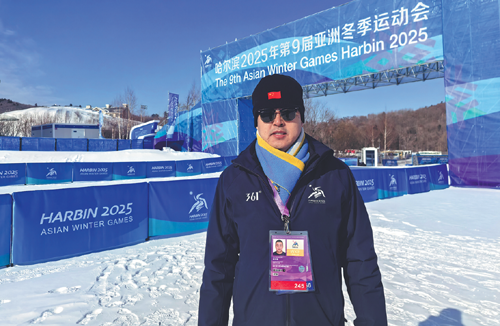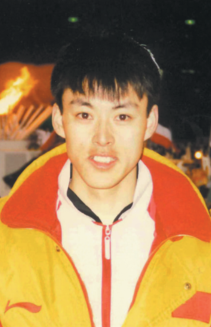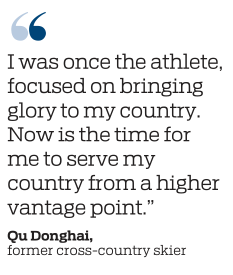Beloved former athlete not snowed into one role

Cross-country skier proves dedication to sports doesn't end at retirement as he helps make Asian Winter Games a success, Li Yingxue reports in Harbin.
Twenty-nine years ago at the 3rd Asian Winter Games in Harbin, the capital of Heilongjiang province, 23-year-old Qu Donghai made history as the first Chinese athlete to compete in a snow event, securing a silver medal in the men's 15km freestyle cross-country skiing competition held in Yabuli.
Fast forward nearly three decades and the 9th Asian Winter Games have returned to Harbin, once again in Yabuli. But this time, Qu's role has shifted. Now an official overseeing event services for the winter competitions, he supports athletes, technical officials and others involved in making the Games successful.
Qu knows every inch of Yabuli — from the venues to the ski trails. From last summer to now, he has witnessed the site's evolution from an empty space into a buzzing competition hub.
For Qu, who has dedicated his life to cross-country skiing, the Asian Winter Games hold deep significance. Reflecting on his journey, he shares, "I was once the athlete, focused on bringing glory to my country. Now is the time for me to serve my country from a higher vantage point."
Born in 1973 in Harbin, Qu's journey into skiing began at the age of 13 when his parents, both from a family steeped in Peking Opera, enrolled him in the local ski team.
"I'm the third child in my family and my older siblings were sent to an ice skating school," Qu recalls. "But I was the only one who made it to the national team."
Qu's early training at his sports school was far from conventional. Every winter, coaches flooded a 400-meter track to create a makeshift speed skating rink. Under the guidance of coach Cui Guangguo, Qu would strap homemade snow skis and boots, crafted from ordinary cotton shoes fixed with makeshift bindings, and train on the icy track.
"I watched the athletes on the national team wearing clothes emblazoned with the national flag and I was filled with envy. I dreamed of wearing that uniform one day," Qu says.
His goal of joining the national team became his driving force. In less than five years, Qu went from a novice to winning the national youth championship, with performances strong enough to secure a second-place finish in adult competitions.
Despite his rising success in domestic competitions, Qu knew the weight of his responsibility. "At the time, over 130 athletes competed internationally, and Chinese competitors rarely made it within the top 50. My mission was clear — to help the team make a breakthrough."
In February 1993, Qu represented China at the 16th Winter Universiade in Zakopane, Poland.
Before the race, his coach advised him to enjoy the competition and aim for a good result without putting too much pressure on himself. But in a stunning turn, Qu finished sixth place in the 30km race, dramatically improving China's standing in international cross-country skiing.
"My coach ran a lap with me after the race. Anyone who didn't know the result might have thought I'd won gold," Qu recalls.
Asiad debut
Qu's strong performance at the Universiade fueled his confidence ahead of the 1996 Asian Winter Games in his hometown of Harbin.
"As a Harbin native, and with this being the first time an intercontinental winter multisport event was held in China, everyone wanted to prove themselves on the home turf," Qu says.
Competition was fierce. Alongside Japan, Kazakhstan debuted a team that included three Olympic and two world champions, all aiming to dominate the individual events. Qu, competing in men's 15km freestyle cross-country skiing, faced immense pressure as the first gold of the winter sports event was at stake.
Starting near the back of the pack, Qu relied on his familiarity with Yabuli's course to overcome the challenge. Kazakhstan's Pavel Ryabinin set a fast pace, but Qu's coach urged him to push for a final sprint. Despite a valiant effort, Qu finished just 14 seconds behind Ryabinin, taking silver.
"Though it's a silver, it's a medal earned through my efforts, and I'm proud of it," Qu reflects.
In the men's 4x10km relay, Qu and his teammates added a bronze medal to their tally, capping off a strong performance at the Games.
Qu had a successful career in cross-country skiing, winning multiple gold medals at the National Winter Games and other domestic competitions, with no regrets.
"Back then, with equipment far behind that of international athletes, we could only rely on determination. Many ask if my results would have been improved with better equipment but to me, that's part of sports — there are no 'what ifs.' I'm content knowing I gave my all," Qu says.
Retiring after the 2003 Aomori Asian Winter Games, Qu coached Harbin's ski team and the national youth team for nine years. A back injury forced him to retire from coaching after the 2012 National Winter Games.
Since then, Qu has held various roles, including team leader of Harbin's figure skating team and a technical official at the 2022 Beijing Winter Olympics and Paralympics.
Return to Yabuli
In July 2023, Harbin was awarded the 9th Asian Winter Games. Qu joined the organizing committee, marking a new chapter in his career.
Qu took charge of operations at the Yabuli venues in May 2024, returning to the site where he once competed. Managing the venues, he says, was very different from his previous roles as an athlete, coach and team leader.
"This job involves a lot of detailed work, ensuring the events run smoothly through teamwork," Qu explains. "The pressure is high."
Qu's team oversees all noncompetition aspects, including medical services, catering, logistics, sponsorships, and language support, while working closely with the sports teams to provide resources and solve problems.
Han Wei, who joined Qu's team last year, praised Qu's experience in both domestic and international competitions. "We started from scratch, learning how to organize events and provide support," Han says. "Whenever we had questions, Qu was there to help."
Yabuli's long winters present challenges, but Qu and his team regularly inspected the eight venues and ski trails to ensure their readiness. During test events earlier in the year, Qu and his team were fully involved, coordinating everything from venue layouts to staff logistics.
"After each event, Qu, the core team, and I would review the day's results, identify problems, and find solutions to resolve them quickly," Han says.
Athletes praised Yabuli's organization and support during the Asian Winter Games. Beijing Winter Olympics champion Xu Mengtao, who won two golds and one silver in freestyle skiing aerials at Yabuli, called it her first gold in 18 years of participating.
"The venues and environment here are so familiar and welcoming. I'm thrilled to compete on home soil," Xu says. "The organizing committee has done an excellent job and I've experienced that support firsthand."
Looking back on his role, Qu reflects, "In 1996, I aimed to showcase the strength of Chinese cross-country skiers. Today, my job is to show that Harbin and China can host a world-class winter sports event."
Qu notes that winter sports have evolved over the past 30 years, benefiting millions. "Harbin is the city of Olympic champions, and now we host high-level events that will push the development of competitive sports and the winter sports industry."
Contact the writer at liyingxue@chinadaily.com.cn


























